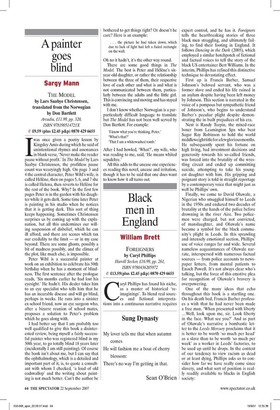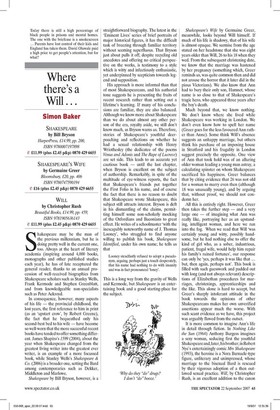Black men in England
William Brett FOREIGNERS by Caryl Phillips Harvill Secker, £16.99, pp. 261, ISBN 9780436205972 £13.59(plus £2.45 p&p) 0870 429 6655 Caryl Phillips has found his niche, as a master of historical 'reimaginings'. To blend real sources and fictional interpretations into a continuous narrative requires expert control, and he has it. Foreigners tells the heartbreaking stories of three black men struggling, and ultimately failing, to find their footing in England. It follows Dancing in the Dark (2005), which employed a similar hotchpotch of fictional and factual voices to tell the story of the black US entertainer Bert Williams. In the interim, Phillips has refined this distinctive technique to devastating effect.
First up is Francis Barber, Samuel Johnson's beloved servant, who was a former slave and ended his life ruined in an asylum despite having been left money by Johnson. This section is narrated in the voice of a pompous but sympathetic friend of Johnson's, who begins to understand Barber's peculiar plight despite demonstrating the in-built prejudices of his era.
Next is Randy Turpin, the mixed-race boxer from Leamington Spa who beat Sugar Ray Robinson to hold the world middleweight title for a few glorious months. He subsequently spent his fortune on high living, bad investment decisions and generosity towards his so-called friends, was forced into the brutality of the wrestling circuit and ended up committing suicide, attempting to take his youngest daughter with him. His gripping and poignant story is told in straight reportage by a contemporary voice that might just as well be Phillips' own.
Finally, we come to David Oluwale, a Nigerian who smuggled himself to Leeds in the 1950s and endured two decades of brutality at the hands of the police before drowning in the river Aire. Two policemen were charged, but not convicted, of manslaughter, and Oluwale's name became a symbol for the black community's plight in Leeds. In this sprawling and intensely emotional section, Phillips' use of voice ranges far and wide. Several nameless acquaintances of Oluwale narrate, interspersed with numerous factual sources — from police accounts to newspaper letters, from mental patients to Enoch Powell. It's not always clear who's talking, but the force of this emotive plea for recognition of Oluwale's bravery is overpowering.
One of the many ideas that echo throughout this book is a startling one. On his death bed, Francis Barber professes a wish that he had never been made a free man. 'When presented with liberty ...Well, look upon me, sir. Look liberty in the face. What see you?' And as part of Oluwale's narrative a bombastic letter to the Leeds Mercury proclaims that it is better to be worth `so much per head' as a slave than to be worth `so much per week' as a worker in Leeds' factories, to be used up until he drops. In the context of our tendency to view racism as dead or at least dying, Phillips asks us to consider how far we have really come since slavery, and what sort of position is really readily available to blacks in English society: Today there is still a high percentage of black people in prisons and mental homes. The one with the briefcase is a smokescreen ... Parents have lost control of their kids and England has taken them. David Oluwale paid a high price to get people's attention, but for what?


































































 Previous page
Previous page